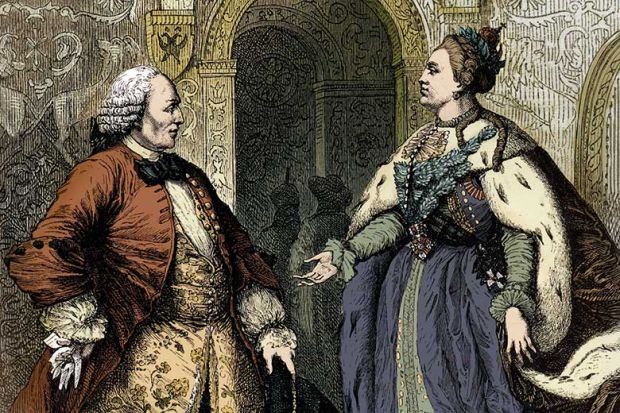The recent documentary 100 Vaginas, televised and given much publicity in the press, celebrates an age – our own – that regards itself as courageously flouting the last social taboos. Perhaps it is surprising to learn, then, that 300 years ago, one of the most esteemed of the French philosophes, Denis Diderot, embarked on his writing career with a novel, Indiscreet Jewels, that recounts the experiences of more than two dozen women through their vaginas.
In Catherine & Diderot, Robert Zaretsky introduces Diderot as one of the pioneering radicals of the Enlightenment. Alongside Voltaire and D’Alembert, and following in the footsteps of Rousseau and Montesquieu, he formed part of a group of intellectuals who delivered a bombshell to challenge the established power of the throne and the altar. Their challenge was not merely cultural, but also political. Drawing on ideas from classical thought, resurrected during the Renaissance, they sought to provide the intellectual foundations to overthrow what they regarded as the despotism of monarchy.
The Russian empress Catherine the Great represented exactly what these philosophes were taking on. Yet astonishingly, as Zaretsky reveals in vivid prose, Catherine was drawn to the intellectual energy of Voltaire and Diderot, reading their works avidly. Eventually, she even invited Diderot, chief editor of the extraordinary Encyclopédie, to her private chambers in the Hermitage. Zaretsky tells the story of their encounter, from their initial fascination through to eventual conflict and realisation of the incommensurability of their positions. Along the way, we are drawn into a web of political intrigue, given an insight into the workings of power and introduced to the dialogue of ideas. The conversation, context and intricacy of these meetings between one of the world’s greatest men of thought and one of the world’s strongest women of action is wittily relayed.
Zaretsky’s book expertly conveys the nature of these two formidable characters, charting Catherine’s development from childhood and describing Diderot’s “nearly comic appearance and gestures”. They are portrayed wisely yet sympathetically. In particular, Zaretsky captures the warmth, conviviality and comedy of Diderot’s persona.
There is a nod to contemporary times, as he compares the political and cultural world of the 18th century to our own. And behind this lies a seriousness of intent. As Zaretsky’s final pages declare, “Though these two remarkable individuals precede us by nearly three centuries, their public ideals, which are increasingly besieged in the west, and their private decency, increasingly scarce among our leaders, are more important than ever.” In the context of Brexit, what message could be more pertinent?
Catherine & Diderot is a dual biography and the biography of a duel: between two great forces in history, the power of reason versus the might of politics. This is heavyweight subject matter, historically, politically and intellectually, yet Zaretsky writes with a lightness, warmth and intimacy that takes the reader to the heart of a “family saga”. His book reads like a compelling historical novel, with passages that made me laugh out loud. Infused with rich sensual and emotional detail, this is one of the most enjoyable biographies I’ve read.
Yvonne Sherratt is a senior lecturer at the University of Bristol and the author of Hitler’s Philosophers (2013).
Catherine & Diderot: The Empress, the Philosopher and the Fate of the Enlightenment
By Robert Zaretsky
Harvard University Press
272pp, £20.00
ISBN 9780674737907
Published 29 March 2019
后记
Print: An intimate salon of opposites




